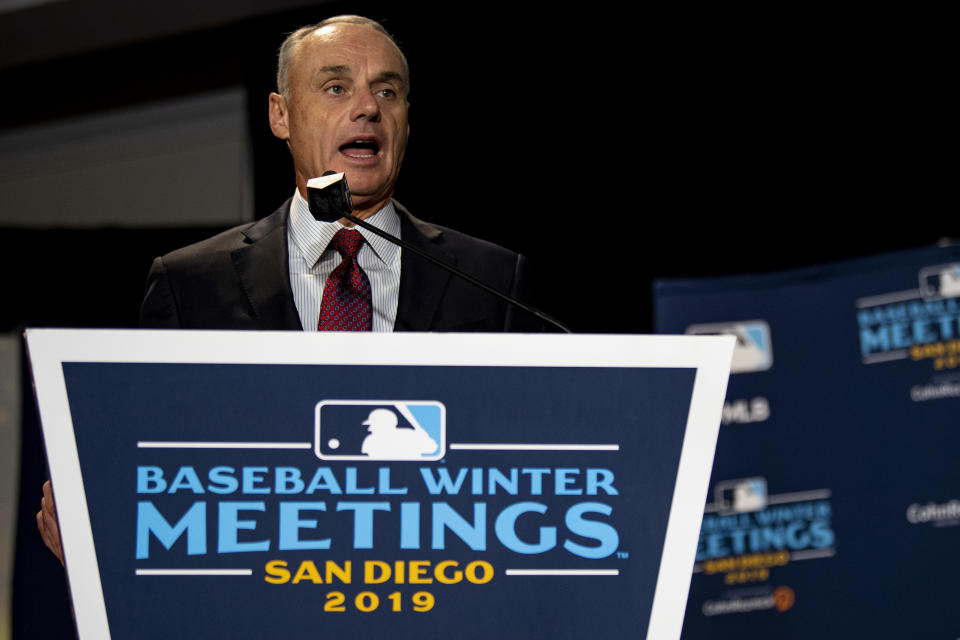Raising minor league pay is a start, but wins MLB little goodwill
Major League Baseball has weathered a veritable firestorm of public-relations affronts this offseason to varying degrees of culpability and capability. But perhaps none less deftly than the battle with Minor League Baseball.
The league’s agreement with the National Association of Professional Baseball Leagues, which governs MiLB, expires after this season. In the process of renegotiating that contract, MLB floated the idea eliminating 42 of the 160 affiliate teams ostensibly to improve untenable travel demands, eliminate dangerously decrepit facilities and spread the limited wealth among fewer players. Someone leaked this proposal, which proved to be a successful ploy for public outrage on MiLB’s behalf. People were pissed at the potential contraction. Mayors of the cities and towns that stood to lose their professional baseball teams were pissed. Bernie Sanders was pissed. A congressional task force was formed to Save Minor League Baseball.
The league wasn’t thrilled either; commissioner Rob Manfred did a poor job of concealing that fact at various media events this winter. “Look,” he said a lot before complaining that the minor league owners had made him look bad by betraying the confidence of the bargaining table. They were the unreasonable ones here. But no one bothered to be sympathetic toward Manfred or the league.
Ultimately, when the sport fails — its fans or constituents — the league office shoulders the blame because the buck stops with the corporate headquarters of this multibillion-dollar antitrust-exempt business. And it’s hard to look like the wronged party in a fight that includes the minor league players making pennies to prop up that business. Frankly it’s a point in favor of the fans and media that they get more riled up about sub-poverty wages than they do about the internal machinations of the MLB-NAPBL negotiations.

MLB was badly losing this public perception battle and they needed a new narrative, a win, as it were. Enter: a plan to raise the minor league minimum salary. By a couple hundred bucks a month — in season, not including spring training. Whether it’s sufficient (it’s not), it’s a step in the right direction. It’s the correct thing to do.
They’re still in the process of negotiating with NAPBL to address travel and facility concerns (read: still considering contraction), executive vice president of baseball economics and operations Morgan Sword wrote in a memo to all 30 teams obtained by the Associated Press. “However, we can move forward unilaterally with our goal of improving compensation for minor league players.”
This is true! It’s also a striking departure from their hard-won commitment to suppressing minor league salaries. The announcement comes just two years after MLB successfully lobbied Congress for a federal exemption from the minimum wage laws for the sake of paying minor leaguers as little as $5,500 for a whole season of work plus an offseason of staying fit.
Kind of makes it seem like this is just a PR stunt. Of course it is — but that doesn’t make the money any less valuable.
MLB deserves to be dinged for doing too little too late, for half measures to address exorbitant inequality, for having the audacity to address poverty with percentages of those paltry sums while raking in billions. But if employees are paid what they command on the market, consider fan perception simply a market force. MLB will pay their minor leaguers what they have to to keep people invested in the game — emotionally and financially. Public pressure is a social good. Especially as it serves to counterbalance corporate creed. The best thing we can say about MLB’s decision makers after this latest announcement is that they care what you think of the league.
The problem is, this probably didn’t buy them quite as much goodwill as they were counting on.
One of the more frustrating plights in baseball writing is trying to get clicks on a story about minor league salaries. They’re low! So low! So rarely offset by splashy signing bonuses. Even as a progressive view on labor relations has come into sports writing vogue, the lack of union protection for minor leaguers often goes unremarked upon. The numbers are less notable than top-end contracts signed by household names and besides, numbers are boring anyway.
And so, unfortunately for Major League Baseball, by raising minor league salaries today, mostly what they’ve done is draw attention to how little they paid and still pay their minor league players.
More from Yahoo Sports:

 Yahoo Finance
Yahoo Finance 
